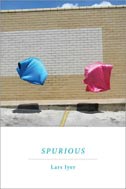by Michael Schapira
One of the great joys of reading Spurious (and I use the word joy advisedly), a novel otherwise lacking in any traditional sense of plot development, is the process of heightening that occurs over the course of the book. Take the unfolding of Lars, who along with his friend and fellow academic W. are the central players in the novel. Over the course of the first 40 odd pages we learn many things about Lars (mostly through W.’s frank assessment of his character deficiencies): Lars has neither shame, nor the capacity to feel shame. He is disloyal (“’You’d break the phalanx .… You will betray me’, says W., ‘I am certain of it’). In addition to having no literary talent, we learn that Lars has no manners (“’And you’re continuously touching yourself. Look at you: you’re doing it now!’ I take my hand out of my shirt.”) And as for the body that Lars is touching: “My obesity always impresses him, W. says …. He wonders what would I be like if I didn’t go to the gym? It’s all channeled into my enormous thighs, W. says. They’re grotesque. – ‘You’re out of proportion!’” Whereas other friendships that W. and Lars admire (particularly that between Levinas and Blanchot) are marked by discretion, Lars is “indiscretion itself”: “There is something cosmic streaming through me. There’s a cosmic storm howling through my ignorance and my shamelessness, says W.”
There is also the issue of “the damp” taking over Lars’ apartment. “The plumber says he’s seen nothing like it…The plumber pitied me so much I had to press money on him …. He wouldn’t leave, but just stood there, looking. And even when he went out the front door, he was shaking his head. – ‘Howay, it’s terrible, man.’” Despite the best efforts of Lars’ heroic space heater and the desperate estimations of plumbers and surveyors, the damp sets into the apartment, forcing Lars to negotiate some sort of relationship with it. “No one understands the damp. It’s Talmudic. The damp is the enigma at the heart of everything …. The damp says: I exist, and that is all. I am that I am: so the damp. I will outlast you and outlast everything: so the damp.” A central question that might confront a reader is whether this process of heightening is leading anywhere or if it is sheer rhetorical flourish (in very capable hands, I would add). Are we to take a strong position on W.’s cruelty towards Lars or the dynamics of their friendship? Are we meant to adopt the perspective of the shopkeepers in Freiburg who “wipe the door handles after we leave and rearrange the books we looked at,” sharing in the disapproval of such reproachable creatures? Are we able to empathize with Lars and W. who are nevertheless able to remain “joyful” in their millenarian sense of their own failings?
These questions are certainly available to a reading of Spurious, and, given the gravity of the topics discussed over the course of the novel (the apocalypse, the worthiness of our intellectual pursuits, the certain demand to be entertained. Yet Iyer self-consciously places himself in the tradition of Peter Cook, Dudley Moore, and other British comics who mastered a highly developed form of satire that comes from the suspension of these questions (as opposed to just aping something familiar, which in this case is the impossibly ineffectual status in which many intellectuals find themselves). It is ultimately through this lens that you are likely to appreciate the grotesque forms that Lars and W. take through the novel. The levels of depravity and viciousness that W. is able to reach through his assessment of Lars and himself truly merit the exalted categories of cosmic, transcendental, and messianic. In this respect Iyer is right to place joy at the heart of the black humor which propels the novel forward. As Lars reports (and it has been difficult limiting my use of the sparkling, though at times acidic language of Spurious in this review): We’re full of joy, W. says as we walk back from the supermarket, that’s what saves us. Why do we find our failings so amusing? But it does save us, we agree on that; it’s our gift to the world.”
This post may contain affiliate links.








